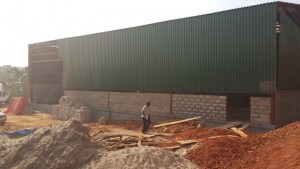Matching funds boost Ugandan SMEs

With the matching funds, Arise and Shine could afford to hire an expert to lay out a five-year strategic plan and invest in expansion.
March 7–Some 214,000 Ugandans, with more than half of them women, have benefited from the World Bank Matching Grant Facility overseen by the Competitiveness and Enterprise Development Project (CEDP) based in Kampala but with Private Sector Foundation (Uganda) oversight.
Some business owners who have received these grants have seen a 3% sales increase in their enterprises. In one example, for more than 10 years, Joseph Bwire and his partner Matia Mubangizi ran their grain milling business, Arise and Shine Millers, from Kisenyi – a slum area on the outskirts or central Kampala
CEDP covers a five-year period and total expenditure of just over $100 million to improve the competitiveness of enterprises in Uganda. It involves the implementation of business environment reforms, including land administration reform; and the development of priority productive and service sectors, including tourism. It ends in March 2019.
Like many businesses in Kisenyi, Arise and Shine Millers operated informally without paying taxes or for utility services. However in 2011, Bwire and Mubangizi, decided to formalize their enterprise by registering it and relocated to Kawempe, a fast growing business and industrial area.
Mubangizi, who is the company General Manager said, “When you operate informally, your suppliers deal with you with a lot of reservations; and worry about your integrity.”
“When you don’t have a permanent address, it is very difficult to build trust with your customers, and importantly, your reputation is questionable,” he said.
In 2016 the company took a further step in strengthening their business by applying and securing a $6,000 grant (UGX 22 million) from the Matching Grant Facility. With this money and their required 50% matching funds, they were able to hire a consultant to review their operations and develop a five-year strategic business plan.
Mubangizi said, “The diagnostic study was an eye opener. We realized that we made decisions without basis, we committed expenses to items or activities that were not necessary and this was costing us the bottom line.”
Arise and Shine Millers is one of 313 micro, small and medium enterprises (MSMEs) that have taken advantage of the facility. Moses Kibirige, the World Bank private sector specialist and task team leader for CEDP said, “More than 2.5 million Ugandans are employed in MSMEs, which makes up about 90% of the country’s private sector. However many firms lack access to loans, making it difficult for them to expand.”
Kibirige said, “SMEs are perceived as high risk by financial institutions, as there is little information available on their operations. SMEs do not have audited financial statements and credit bureau coverage is very limited in Uganda. To compensate, banks demand high levels of collateral, predominantly immovable, which most SMEs do not have.”
Arise and Shine has not only grown, but it has expanded to command more than 90% of the market share for maize meal supplied to the Northern Uganda market, which is also their source market for grains. With the increase in demand, they have increased milling hours from 16 hours to 20 per day, and they are building a new warehouse to hold their new, state-of-the-art milling machinery. Plans are to expand very soon to the Kenyan market, one of the biggest consumers of maize meal in the region.

 African Heads of state head to South Korea next week for Summit talks
African Heads of state head to South Korea next week for Summit talks
 Trading leads as main source of income for Ugandans
Trading leads as main source of income for Ugandans
 New leadership for bankers’ umbrella as total assets top $12 billion
New leadership for bankers’ umbrella as total assets top $12 billion
 Brussels Airlines to announce Nairobi service
Brussels Airlines to announce Nairobi service
 SITA promises enhanced travel experience after Materna acquisition
SITA promises enhanced travel experience after Materna acquisition
 Saudia’s 105 aircraft order stretches A320neo lead over rival Max
Saudia’s 105 aircraft order stretches A320neo lead over rival Max
